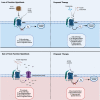Amylin Pharmacology in Alzheimer's Disease Pathogenesis and Treatment
- PMID: 34852745
- PMCID: PMC9886804
- DOI: 10.2174/1570159X19666211201093147
Amylin Pharmacology in Alzheimer's Disease Pathogenesis and Treatment
Abstract
The metabolic peptide hormone amylin, in concert with other metabolic peptides like insulin and leptin, has an important role in metabolic homeostasis and has been intimately linked to Alzheimer's disease (AD). Interestingly, this pancreatic amyloid peptide is known to self-aggregate much like amyloid-beta and has been reported to be a source of pathogenesis in both Type II diabetes mellitus (T2DM) and Alzheimer's disease. The traditional "gain of toxic function" properties assigned to amyloid proteins are, however, contrasted by several reports highlighting neuroprotective effects of amylin and a recombinant analog, pramlintide, in the context of these two diseases. This suggests that pharmacological therapies aimed at modulating the amylin receptor may be therapeutically beneficial for AD development, as they already are for T2DMM. However, the nature of amylin receptor signaling is highly complex and not well studied in the context of CNS function. Therefore, to begin to address this pharmacological paradox in amylin research, the goal of this review is to summarize the current research on amylin signaling and CNS functions and critically address the paradoxical nature of this hormone's signaling in the context of AD pathogenesis.
Keywords: Alzheimer’s disease; amylin; amyloid; diabetes; metabolism; neuroprotection; therapy.
Copyright© Bentham Science Publishers; For any queries, please email at epub@benthamscience.net.
Figures

References
-
- Alzheimer’s & Dementia | Alzheimer’s Association. [cited 2021 Mar 26]. Available from: https://www.alz.org/alzheimer_s_dementia.
Publication types
MeSH terms
Substances
Grants and funding
LinkOut - more resources
Full Text Sources
Medical

